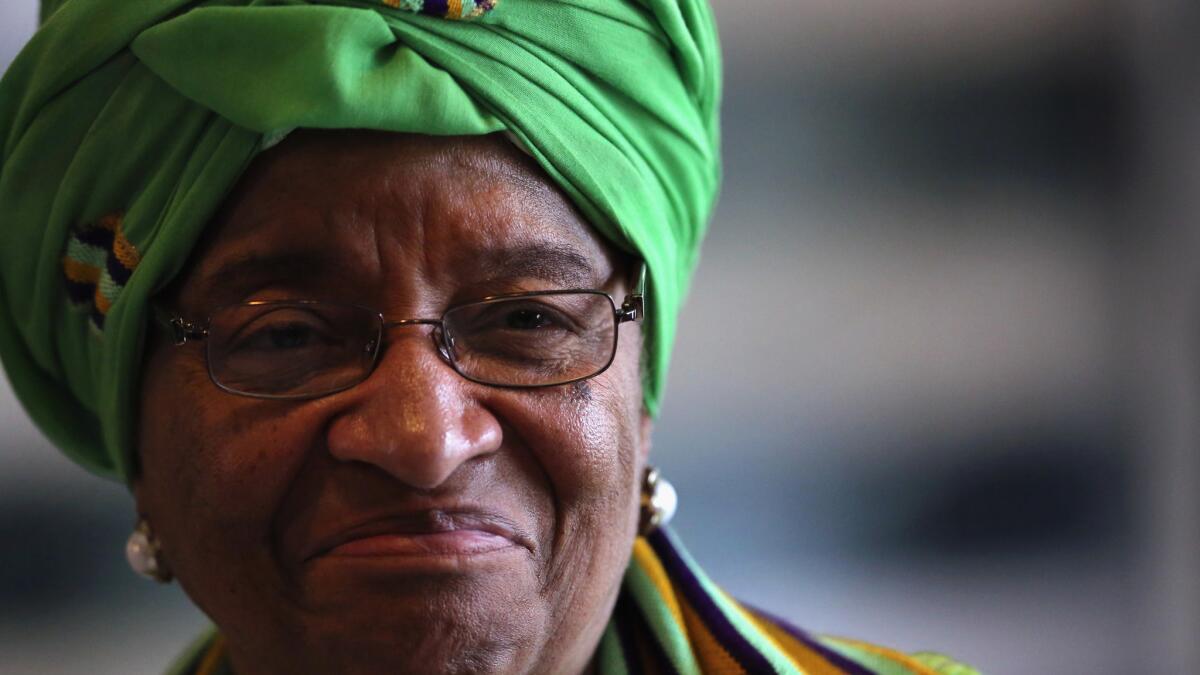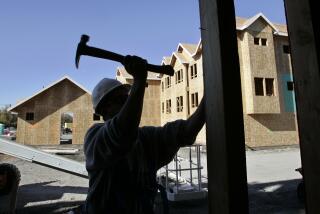Op-Ed: Liberia must learn to honor the rights of rural residents to manage their own land
- Share via
Liberia, the first African country to declare itself a republic and one of three African nations to take part in the establishment and adoption of the Universal Declaration of Human Rights in 1948, is on the brink of its own landmark achievement in human rights. Internal peace and security is within sight, an amazing vision after the recent Ebola epidemic devastated a country still scarred by decades of civil war.
But to get there, Liberia’s national legislature must overcome the bane of African politics everywhere — conflict caused by rapacious and uninhibited economic development and the ensuing human rights violations.
President Ellen Johnson Sirleaf won a Nobel Peace Prize in 2011, six years after her election, for guiding the country through the early stages of recovery. The country’s infrastructure had been demolished by two civil wars that killed hundreds of thousands of people between 1989 and 2003.

However, the current economic model of transferring land to foreign investors on a massive scale fails to acknowledge the rights of rural communities to collectively own and manage their territories. These foreign investments rarely deliver their promise of shared economic development, and instead impoverish the very people they claim to help.
Some 40% of Liberia is under concessions for logging, oil and mining. While these lands may appear empty on government maps, they are home to millions. A recent analysis by the Munden Group of 237 mining and agriculture concessions in Liberia found that all had established communities in their midst.
The ancestors of the people in these rural communities have lived on and farmed this land since before Liberia became a republic in 1847 — long before Sirleaf’s government took power and before the dictatorships and civil wars that wreaked havoc across the country.
These people rely on the lands as a source of food and shelter, as well as the foundation of their culture and spirituality. Having survived so much, these people now face the prospect of losing their homes to multinational corporations. True economic development would instead improve the lives of people in these communities, rather than displace them.
Palm oil in particular has been a flashpoint in Liberia, with the government giving international corporations license to establish industrial plantations and handle the local communities as they see fit. This economic model has been tried in Indonesia, where it devastated the environment, failed to increase rural employment, and resulted in Indonesians losing their homes and livelihoods. Liberia’s experience is proving no different.
Without secure rights, the countryside risks a resurgence of violent conflict. In Sinoe County in southeastern Liberia, the backlash from one palm oil development triggered a riot so severe that Deputy Internal Affairs Minister Varney Sirleaf, a nephew of President Sirleaf, had to be smuggled away from an angry mob in the back of a company vehicle.
The Land Rights Act, introduced in the Liberian Legislature in 2014, aims to rectify these problems and secure the rights of Liberia’s people. The legislation was drawn from Liberia’s progressive Land Rights Policy, which was written in consultation with civil society and affirms that the government should respect the customary rights of its citizens. Sirleaf has promised to see the legislation become law.
If the Legislature passes the bill as introduced, without watering down its key provisions, no African country would have a stronger embrace of Article 17 of the U.N. Declaration of Human Rights, which defines the right for individuals or communities to own property. The Land Rights Act would recognize the rights of millions of Liberians to own the land that they have lived and worked on for generations. The act would also recognize the rights of communities to collectively own and manage their ancestral territory.
Liberia was one of only three African countries to sign the U.N. declaration when it was ratified in 1948. This is an opportunity for the country to once again lead the international community in embracing the most basic human rights.
The problem of land ownership and community rights is not limited to Liberia, of course. We see this throughout West Africa — from Senegal to Mali — and land grabs take place all over the world. Many of these countries are going through their own land reform processes. If Liberia passes a progressive Land Rights Act, it could be a model for the rest of the region, and indeed the world.
In Kenya, entire communities have been forcibly relocated to preserve the upstream sources of drinking water for urban populations. In Nepal, a broad swath of forestland is being emptied of its inhabitants in the name of conservation. In the Peruvian Andes, enormous mines have been excavated where indigenous communities had lived for centuries. And in Brazil, large swaths of the Amazon are being cleared — along with the indigenous peoples who live there — to make room for enormous hydropower projects.
All these countries, and many more, can benefit from seeing Liberia step forward and recognize land ownership as a basic human right. But if the Land Rights Act is not passed before the end of the Legislature’s current session, Tuesday, it is not just a matter of waiting until next year. Election periods in Africa are often tense affairs, especially in countries still scarred by civil war. The act would likely linger through the election, and be left to a new government that may or may not take action.
Rather than waiting to find out, Liberia’s Legislature should pass the Land Rights Act without further delay. This is an opportunity for Liberia to build its economy sustainably, secure the human rights of its populace, and prevent a slide back into devastating conflict. Tomorrow might just be too late.
Alioune Tine is Amnesty International’s regional director for West and Central Africa.
More to Read
Sign up for Essential California
The most important California stories and recommendations in your inbox every morning.
You may occasionally receive promotional content from the Los Angeles Times.










